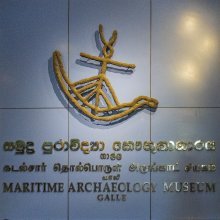Mast: 4 definitions
Introduction:
Mast means something in Hinduism, Sanskrit, the history of ancient India, Hindi. If you want to know the exact meaning, history, etymology or English translation of this term then check out the descriptions on this page. Add your comment or reference to a book if you want to contribute to this summary article.
Images (photo gallery)
In Hinduism
Yoga (school of philosophy)
Source: ORA: Amanaska (king of all yogas): A Critical Edition and Annotated Translation by Jason BirchThe Mast (of a ship) is denoted by the Sanskrit term Stambha, according to the Amanaska Yoga treatise dealing with meditation, absorption, yogic powers and liberation.—Accordingly, as Īśvara says to Vāmadeva: “[...] As long as the highest reality is not known, the mind is unrestrainable. However, when the highest reality is known, the mind becomes [still] like a crow [perched] on the mast (stambha) of a ship. [...]”.

Yoga is originally considered a branch of Hindu philosophy (astika), but both ancient and modern Yoga combine the physical, mental and spiritual. Yoga teaches various physical techniques also known as āsanas (postures), used for various purposes (eg., meditation, contemplation, relaxation).
India history and geography
Source: Singhi Jain Series: Ratnaprabha-suri’s Kuvalayamala-katha (history)The Mast (of boats and ships) were subjected to certain preparatory rituals performed before Sea-voyages in ancient India (known in Prakrit as: jattā, or Sanskrit: yātrā), and was vividly depicted in the Kathās (narrative poems) such as Uddyotanasūri in his 8th-century Kuvalayamālā (a Prakrit Campū, similar to Kāvya poetry).—Details of preparation for sea-voyage are given which include the following items relating to preparatory ritual and the equipment of the ship: [e.g., raising of the mast;] [...]. When the ship was to take off auspicious musical instruments were sounded, conch-shells were blown, auspicious songs were sung, [...].

The history of India traces the identification of countries, villages, towns and other regions of India, as well as mythology, zoology, royal dynasties, rulers, tribes, local festivities and traditions and regional languages. Ancient India enjoyed religious freedom and encourages the path of Dharma, a concept common to Buddhism, Hinduism, and Jainism.
Languages of India and abroad
Hindi dictionary
Source: DDSA: A practical Hindi-English dictionaryMast in Hindi refers in English to:—(a) intoxicated; intoxicated by passion; carefree, wanton; sexually excited; radiant with joy, in a lively frolic; ~[maula] a lively and carefree person; ~[rama] see ~[maula]..—mast (मस्त) is alternatively transliterated as Masta.
...
See also (Relevant definitions)
Starts with (+66): Mashtuppu, Mast tree, Mast-ul-ghoul, Masta, Mastaba, Mastadaru, Mastagi-desi, Mastak, Mastaka, Mastakabhisheka, Mastakadi, Mastakajvara, Mastakakhya, Mastakalunga, Mastakam, Mastakamulaka, Mastakapatti, Mastakapindaka, Mastakarecana, Mastakashula.
Ends with: Almast, Madanmast, Samast.
Full-text (+290): Tirakati, Padaraka, Shidakathi, Mahadandadhara, Polinda, Kupadanda, Gunavrikshaka, Tirakathi, Kupa, Galabata, Tampuli, Ogeimi, Cakkarapantacceti, Kalaitavam, Amorphophallus aphyllus, Kalavame, Atipala, Boyari, Motadhamni, Kaaluvaame.
Relevant text
Search found 43 books and stories containing Mast; (plurals include: Masts). You can also click to the full overview containing English textual excerpts. Below are direct links for the most relevant articles:
Heimskringla (by Snorri Sturlson)
Part 157 - Of King Canute's Ship The Dragon < [Chapter VII - Saga Of Olaf Haraldson]
Part 17 - The Battle In Gautland < [Chapter III - Harald Harfager's Saga]
Part 6 - Of Erling Skakke < [Chapter XVI - Magnus Erlingson's Saga]
To an Irish Poet < [January-February 1935]
The Poet as Critic: An Approach to Coleridge < [July – September, 1979]
Thou Art All < [January – March, 2000]
Amarakoshodghatana of Kshirasvamin (study) (by A. Yamuna Devi)
Economics (5): Means of Transportation < [Chapter 3 - Social Aspects]
Namasmarana - A Universal Sadhana (by Narayana Kasturi)
A. Significance Of Namasmarana < [Significance And Power Of Namasmarana]
Visuddhimagga (the pah of purification) (by Ñāṇamoli Bhikkhu)
Insight (8): Equanimity about Formations < [Chapter XXI - Purification by Knowledge and Vision of the Way]
The Jataka tales [English], Volume 1-6 (by Robert Chalmers)
Jataka 442: Saṅkha-jātaka < [Volume 4]
Jataka 190: Sīlānisaṃsa-jātaka < [Book II - Dukanipāta]
Jataka 339: Bāveru-jātaka < [Volume 3]
Related products

